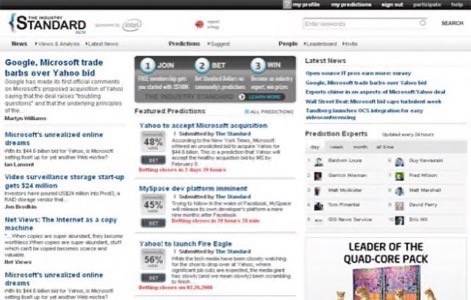In 2000, the Industry Standard was one of the hottest magazines on the planet. It was flush with VC dollars and sold more ad pages than any magazine in history. But when the dot-com wave it was riding finally crashed, the magazine receded with the tide and filed for bankruptcy in 2001.That’s why when news that it was coming back leaked this fall, it prompted some to declared that the “bubble is back.”

The Industry Standard will relaunch today in public beta as a strictly online publication coupled with a futures market. We got a chance to check it out early and speak with Derek Butcher, the magazine’s General Manager.
According to Butcher, the magazine’s brand still had so much equity left in it, that publisher IDG (who was an investor in the original magazine and bought out the publication’s assets) couldn’t resist trying it again. Now that Silicon Valley is hot once more, and ad dollars are flowing on the web, it seemed like a good time to try relaunching the business mag. There’s just one problem: blogs have this space covered to death.
So rather than focus on breaking news, the Standard is opting to focus instead of analysis of the business and technology news. Content will be short editorials (300-400 words) that break down business news written by outside contributors (that is, bloggers, analysts, and industry pundits will submit content to the Standard for publication). It’s an editorial approach that Butcher seemed to describe as one part ReadWriteWeb and one part Huffington Post — though unlike HuffPo, the Standard will pay its contributors, and unlike RWW, the focus will be on business over tech analysis.
“No single voice will dominate the discussion, which is why we decided to forgo the somewhat print-centric idea of an editor in chief, despite talking to some great people for the position,” said managing editor Ian Lamont in a press release. “We want readers to get viewpoints from the widest range of contributors possible, with the common theme being that these contributors are all people who believe that the Web is a major paradigm shift in business.”

However, the editorial isn’t the most intriguing part of the relaunch. What really sticks out about the new Industry Standard is the prediction market. A prediction market is something like a stock exchange where the cash value of assets is tied to predictions. People invest in predictions they think will come true with the idea being that the more people who predict something, the more likely it should be to actually happen in real life. Most prediction markets in the US use play money because of gambling restrictions, and the Industry Standard’s is no different.
Users start out with $100,000 in play funds and invest in time sensitive predictions like, “Apple will ship 10 million iPhones in 2008,” or “Yahoo! will accept Microsoft’s takeover bid by February 8.” Users can also suggest predictions, which are in turn voted up or down by other users.
Prediction markets have shown a remarkable tendency to accurately predict the future, and the Industry Standard’s market can theoretically be used to keep writers honest. Any writer who is constantly throwing out wild predictions can have his ideas tested on the open market. Butcher hopes that the prediction market will have a reciprocative effect on the editorial, with writers playing off the things people are betting on in the market, and the market reacting to the things people are writing about.
The market is very well designed and rather easy to use, but will it, coupled with the out sourced editorial content, be enough to recapture the late-90s magic that made the Industry Standard a household name? The other quintessential Silicon Valley magazine of the dot-com boom was RedHerring, which relaunched in August as a web-based publication (including a video site and social network) to little fanfare. RedHerring’s traffic has actually declined since then, according to Compete, and even articles on big stories like the Microsoft bid for Yahoo! only attract a handful of comments — compared to, say over 800 on Digg — and thousands if you count how many times the story made the main page.
It’s possible that the media market has shifted so much since the late-90s that magazines will never be able to reinvent themselves on the web in the face of competition from a now established and well-connected blogosphere and user-powered aggregation of sources (like Digg and Reddit). But the Standard is probably smart to eschew the traditional editorial structure and follow the example set by successful blogs communities like the Huffington Post and Seeking Alpha, by bringing together a group of outside contributors who may already have a readership elsewhere.
Try out the Standard web site and prediction market and tell us what you think. Can the Industry Standard return to glory or will they flame out again? Let us know in the comments below.





















